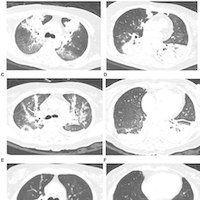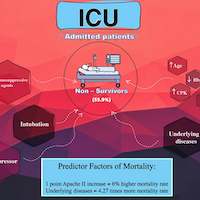Tag: ARDS

COVID-19 Airway Management and Ventilation Strategy for Critically Ill Older Patients
This book describes the issues and challenges that clinicians encountered in the management of older critically ill patients during the COVID-19 pandemic, and offers practical information on how to manage them. Older... read more

Omadacycline Treatment of Severe Pneumonia Complicated with ARDS During COVID-19
Metagenomic next-generation sequencing (mNGS) has a significant value in the diagnosis of Chlamydia psittaci infection. Timely treatment of omadacycline can improve prognosis and provide a promising new option for the treatment... read more

Clinical Outcomes in Critically Ill COVID-19 Unvaccinated Patients Admitted to the ICU
We analyzed unvaccinated critically ill ICU patients with COVID-19 and interpreted their demographics, clinical characteristics, comorbidities, and laboratory data upon ICU admission for a better understanding of their impact... read more

Extracorporeal Life Support for Adults
This book presents a concise, evidence-based review of extracorporeal life support (ECLS) for adult diseases. It describes the use of ECLS with patients who are experiencing severe hypoxemic respiratory failure (ARDS and... read more

Heat Shock Protein 27 in COVID-19 and non-COVID ARDS Pathogenesis
Acute respiratory distress syndrome (ARDS) is a common cause of hypoxemic respiratory failure in intensive care units that has increased dramatically as a result of the COVID-19 pandemic. In both COVID-19 and non-COVID... read more

Oxygenation Improvement in Hyperinflammatory Ovine ARDS Treated with Methylprednisolone
Early and persistent improvement in oxygenation was seen only in hyperinflammatory ovine ARDS treated with methylprednisolone, while hemodynamic situation and survival was improved in both injury models and corticosteroid... read more

Uncovering Heterogeneity in Sepsis
Among critically ill patients with sepsis, subtype strategies using clinical, biomarker, and transcriptomic data do not identify comparable patient populations and are likely to reflect disparate clinical characteristics... read more

Genetic Causal Factors of ARDS
This comprehensive study highlights the importance of utilizing the MR-pheWAS framework in unraveling the complex etiology and pathogenesis of ARDS, and further underlines the value of integrating blood-based biomarkers into... read more

Inflammatory Subphenotypes in Patients at Risk of ARDS
We identified hyper- and non-hyperinflammatory subphenotypes in patients at risk of ARDS upon presentation to the emergency department. These subphenotypes remained identifiable over time and a hyperinflammatory subphenotype... read more

Convalescent Plasma Cuts Death by 10% in COVID Patients on Mechanical Ventilation
A randomized clinical trial in Belgium finds that convalescent plasma reduces death rates by about 10% in COVID-19 patients requiring invasive mechanical ventilation. University of Liege researchers led the open-label... read more

HFNC vs. CPAP in COVID-19 Patients with ARDS in ICU
Acute hypoxic respiratory failure in coronavirus disease 2019 (COVID-19) pneumonia has been treated with oxygen delivered by oxygen masks and non-invasive ventilation (NIV) with continuous positive airway pressure (CPAP),... read more

Back To The Future: ARDS Guidelines
In June 2023, Intensive Care Medicine published the European Society of Intensive Care Medicine (ESICM) practical guidelines for respiratory support in patients with acute respiratory distress syndrome (ARDS). This monumental... read more

Reducing Mortality in Critically Ill Patients
This book describes the techniques, strategies, and drugs that have been demonstrated by multicenter randomized trials to influence survival in critically ill patients, defined as those who have acute failure of at least... read more

1-year Survival Rate of COVID-19 Infected Patients with ARDS Based on Ventilator Types
The study revealed that the utilization of non-ICU sophisticated ventilators was linked to a higher mortality rate when compared to standard ICU ventilators in COVID-19 patients with ARDS. However, given the shortage and... read more


